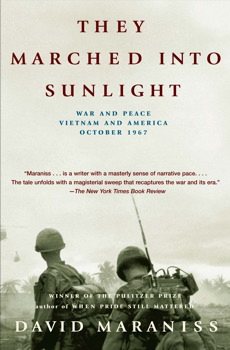 |
They Marched Into Sunlight: War and Peace in America and VietnamBy Bonnie Caracciolo (reviewer)
They Marched Into Sunlight: War and Peace in America and Vietnam David Maraniss begins his book with a short biography of each young man turning up at Ft. Lewis, Washington on their way to the USNS Pope, embarking from San Diego for the long voyage to South Vietnam. These young enlistees were heading to the port of Vung Tau on the South China Sea, a world away. The author introduces us to each man and we immediately feel a kinship. Meanwhile, the reader is introduced to a South Vietnamese soldier who has joined with the North to drive the foreigners from their land. We feel a kinship, somehow, with this man as well. 1967 was a benchmark year in world history. The year was especially significant in the United States where young people were fighting wars on two fronts. David Maraniss stops time during several days in the month of October. His book focuses on the twin stories of those fighting and those protesting a war that divided a generation. Intertwined with the personal remembrances of the soldiers of the Black Lions, are the thoughts and memories of their Viet Cong adversaries. A personal, inside narration of their deepest feelings about their loved ones, their homes, their friends, and their expectations. On the morning of October 17, 1967, 155 US soldiers headed into the jungle, loaded down with ammunition hoping for an ordinary day in a not-so-ordinary war. Alpha Company would lead the way with Delta just behind them. Yet, there would be a feeling of foreboding. Students awoke in Madison on that same Fall morning, with the plan for a demonstration and protest against the presence of Dow Chemical on campus. Dow produced napalm, a weapon used in the Vietnam War. Neither group would encounter what they expected, far from it. The telling of the stories is as poignant and powerful as the stories are themselves. This is a book of non-fiction that has the incredible feel of an important novel. If you have never read a book about the era, this is the one you must read for its gut-wrenching reality and narrative power. It is the story of a generation. It is a story for the ages. If you do not read Maraniss' book, you will have denied yourself the very center of the world that was the era of student revolt and a war that America still debates. The many facts and details are offered up in a panoramic view of dissent in America—of the truth of leadership in the military, the government, and on college campuses. Life as we knew it changed forever. And the lives of those remembered in this book changed for good. Maraniss took his title from Vietnam veteran Bruce Weigl's poem, "Elegy." Bonnie Caracciolo was born in Boston in 1951. She is the publisher of the blog "Vietnam: My War Too" at http://mywartoo.blogspot.com. She currently lives in Atlanta but is relocating to Boston soon. She says, "If being anti-war is a crime, consider me a career criminal."
|


